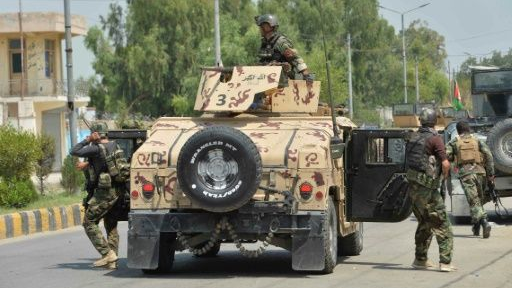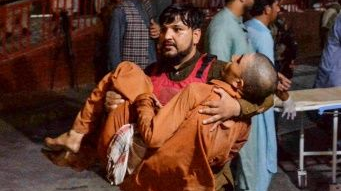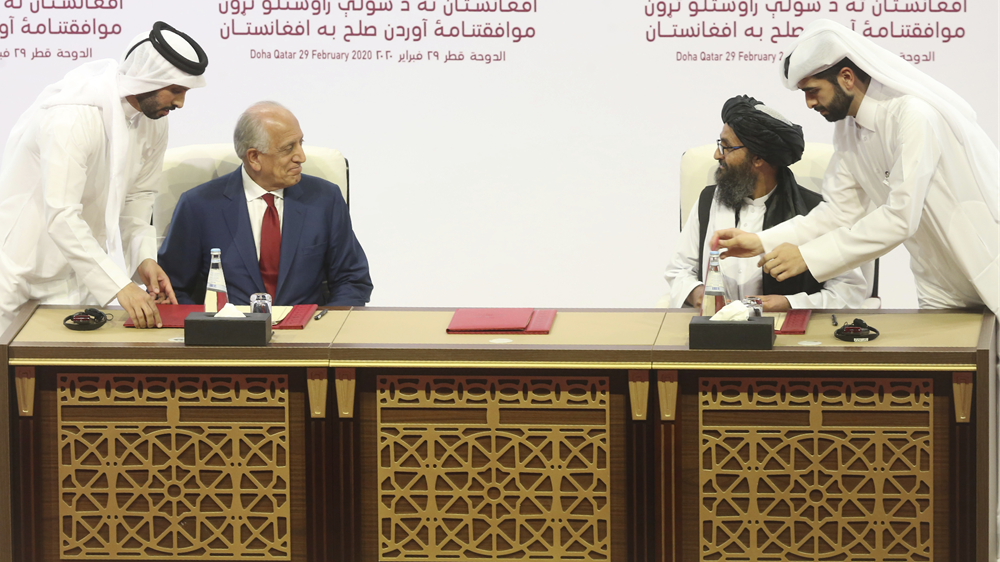
Afghan soldiers arrive during an attack on a prison in Jalalabad. /AFP
Afghan soldiers arrive during an attack on a prison in Jalalabad. /AFP
At least 29 people were killed in a raid on an Afghan prison claimed by ISIL, officials said Monday, as the country waited to see if a government ceasefire with the Taliban would rupture after its formal expiration.
Fighting finally ended at mid-afternoon at the jail in the eastern city of Jalalabad, where about 1,700 ISIL and Taliban inmates were being held. ISIL's news outlet Amaq said its fighters were behind the raid.
ISIL fighters had started with a suicide car bomb attack, which allowed more than 1,000 inmates escape before most of them were recaptured. More than 300 prisoners were still at large, Attaullah Khugyani, spokesman for the governor of Nangarhar province, said.
He added that 29 people had died in the fighting, including civilians, prisoners and members of the security forces; 50 more people were wounded in the attack. A defense ministry statement said all 10 attackers had also been killed by Afghan security forces.
An AFP correspondent who toured the prison after the attack saw the bodies of some attackers and inmates lying in the prison compound. The entrance to the jail was blown up by the initial car bomb attack. Several cells were burnt and damaged, while some had prisoners inside.
Officials said Afghan Chief of Army Staff Lt. Gen Yasin Zia arrived on Monday to oversee the operation, which involved special forces.

A victim of the August 2, 2020 attack on the Jalalabad prison is carried to the hospital. /AFP
A victim of the August 2, 2020 attack on the Jalalabad prison is carried to the hospital. /AFP
The violence comes at a sensitive time for Afghanistan as the U.S. attempts to usher in peace talks between the Afghan government and the insurgent Taliban. Both had agreed to hold a three-day ceasefire over the Muslim festival of Eid al-Adha which ended Sunday.
Under a deal signed by the Taliban and the United States in February, the "intra-Afghan" talks were supposed to start in March. Talks, however, were delayed amid political infighting in Kabul, and as an agreed prisoner swap dragged on.
Both Kabul and the Taliban have signaled they could be ready to start talks after Eid, and the Afghan government on Sunday offered to extend the ceasefire. The insurgents have not formally responded.
The biggest hurdle to talks starting is a contentious prisoner swap stipulated under the U.S.-Taliban deal. Under the exchange, Kabul is meant to free around 5,000 Taliban prisoners in return for 1,000 Afghan security personnel held captive by the insurgents.
The National Security Council said Sunday that more than 4,900 inmates have been freed, and the Taliban last week said they had already met their side of the commitment.
01:47

Afghan authorities, however, have refused to free about 400 Taliban inmates accused of serious crimes such as murder and even attacks against foreign countries. A gathering of Afghan elders will decide their fate on August 7 in Kabul, President Ashraf Ghani's spokesman said.
Sediq Sediqqi said Washington had told Kabul that if it freed 4,600 Taliban prisoners the peace talks could begin.
"We don't see any honesty and commitment from the Taliban for peace," Sediqqi told reporters.
U.S. Secretary of State Mike Pompeo, eager for a diplomatic win ahead of elections, discussed the prisoner issue by videoconference Monday with Taliban chief negotiator Mullah Baradar, insurgent spokesman Suhail Shaheen said.
(With input from AFP and Reuters)